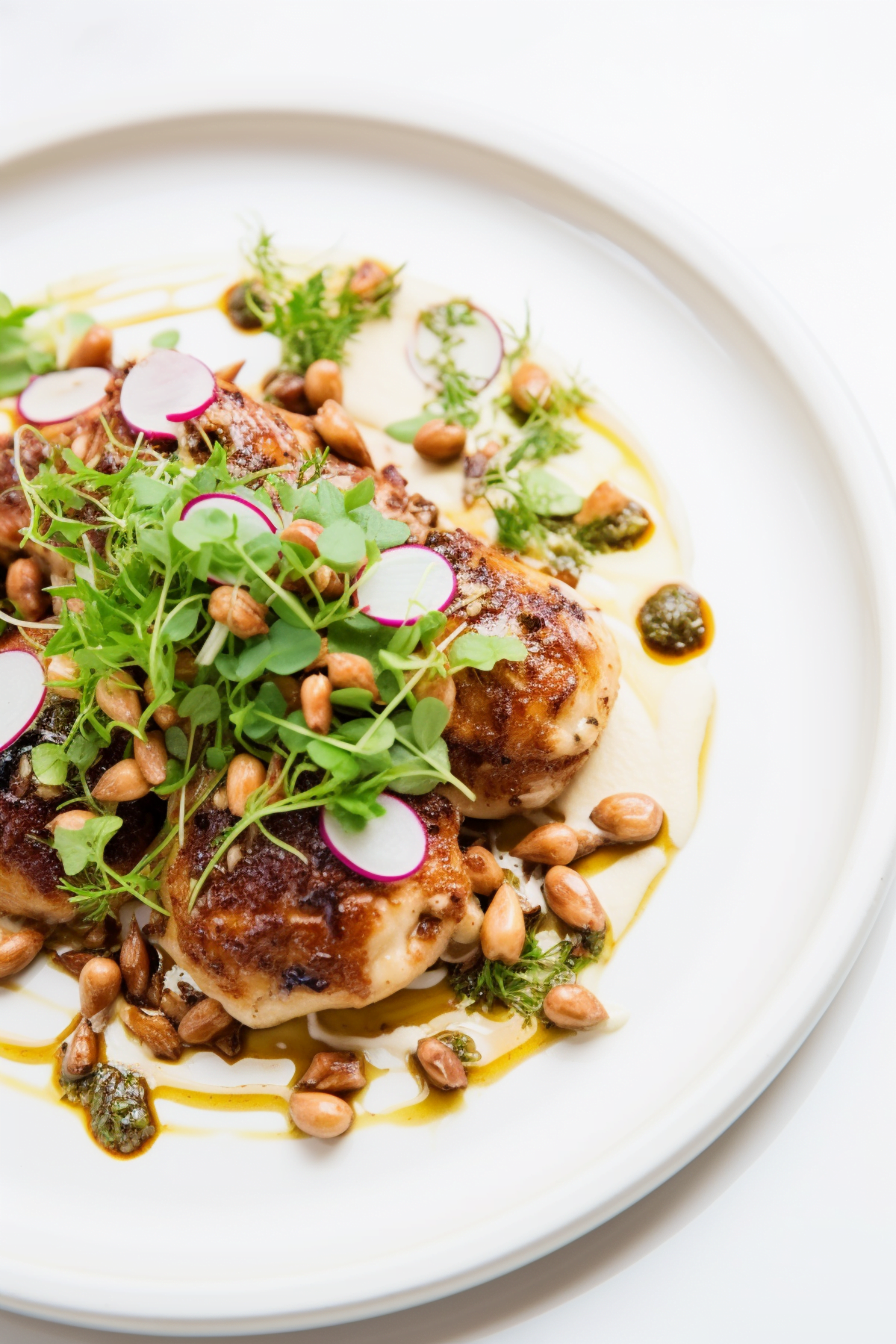Embark on a Culinary Journey with Palestinian Musakhan
Imagine the rich, tangy aroma of sumac-infused chicken paired with the sweetness of caramelized onions, all nestled atop a warm, soft flatbread. This is the essence of Palestinian Musakhan, a dish that not only tantalizes the taste buds but also carries with it a story of tradition and culture. In this post, you will discover how to create this vibrant dish in your own kitchen, bringing a piece of Palestinian heritage to your table.
Whether you’re a seasoned chef or a culinary novice, this recipe for Palestinian Musakhan with Sumac Chicken and Caramelized Onions is designed to guide you through each step, ensuring a delightful dining experience. Let’s dive into the world of Middle Eastern flavors and create a meal that’s as memorable as it is delicious.
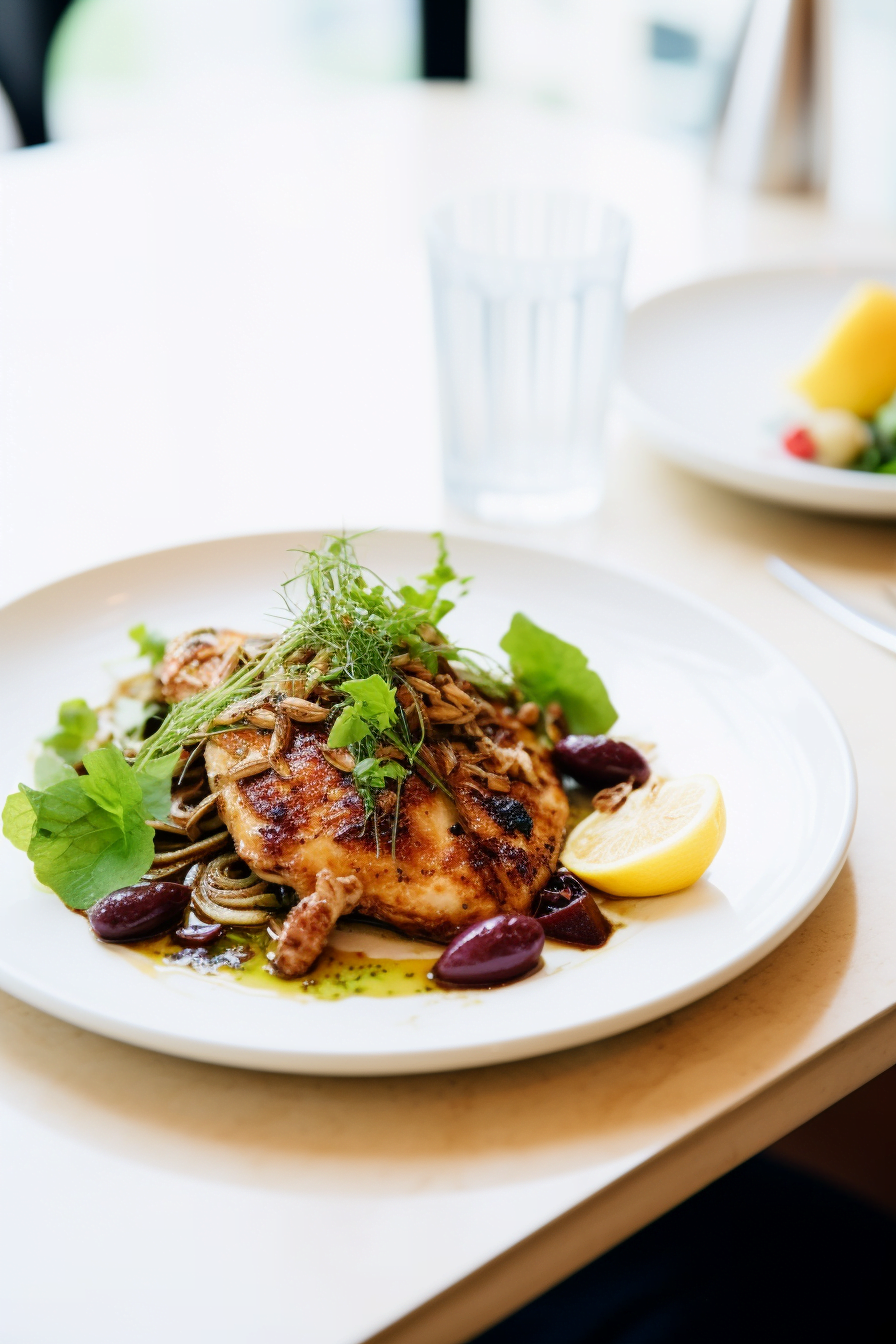
Recipe Details and Background
Palestinian Musakhan is more than just a dish; it’s a celebration of Palestinian culture and a staple in their cuisine. Originating from the rural villages, Musakhan was traditionally prepared to mark the olive oil pressing season. Families would gather to share this meal, made with simple, locally sourced ingredients that embody the essence of Palestinian hospitality.
The heart of this dish lies in its bold use of sumac, a spice that imparts a distinctive lemony flavor, and the liberal use of olive oil, a golden treasure of the Mediterranean. The onions, caramelized to perfection, add a layer of sweetness that complements the tanginess of the sumac, while the chicken, seasoned and roasted, provides a succulent base for these flavors to meld.
As with many traditional recipes, Musakhan is a dish that tells a story with every bite. It’s a testament to the agricultural bounty of the land and the communal spirit of its people. This recipe, passed down through generations, has become a symbol of identity and a source of pride for Palestinians everywhere.
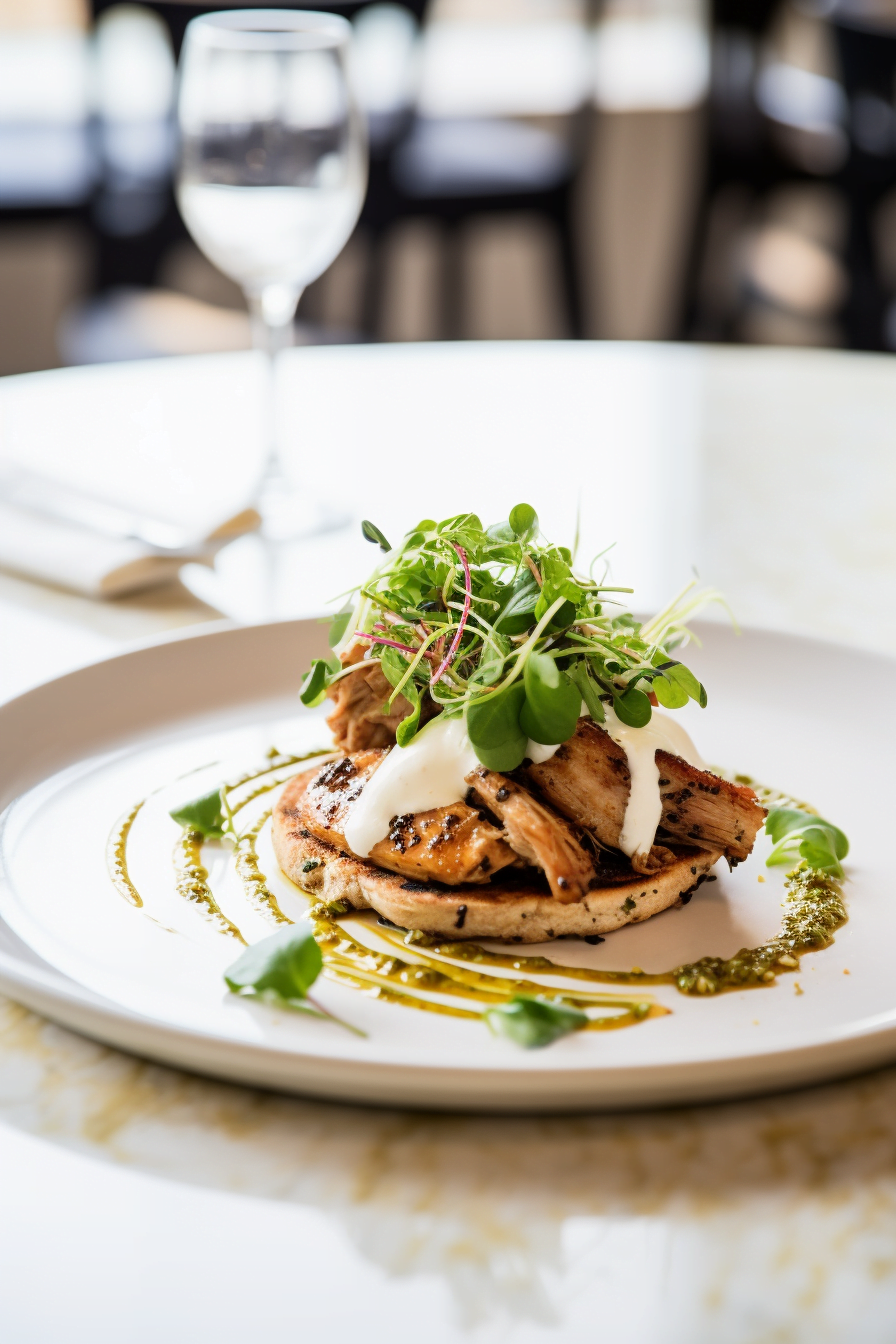
The Method: Crafting the Perfect Musakhan
Creating the perfect Musakhan is an art that involves patience and attention to detail. The key to success lies in the caramelization of the onions; they should be cooked slowly, allowing their natural sugars to develop a deep, rich flavor. As you stir the onions, they will transform into a golden-brown hue, becoming a luscious topping for the chicken.
The chicken thighs are the best choice for this dish, as their higher fat content ensures the meat remains moist and flavorful during the roasting process. Seasoning the chicken generously with sumac, cumin, and coriander will create a crust that is both fragrant and visually appealing. Searing the chicken before baking helps to lock in these flavors and gives the skin a delightful crispness.
Traditionally, Musakhan is served on taboon bread, which absorbs the juices from the chicken and onions, making each bite a harmonious blend of textures and tastes. If you can’t find taboon bread, don’t worry; other flatbreads like naan or pita are excellent substitutes that still honor the spirit of the dish.
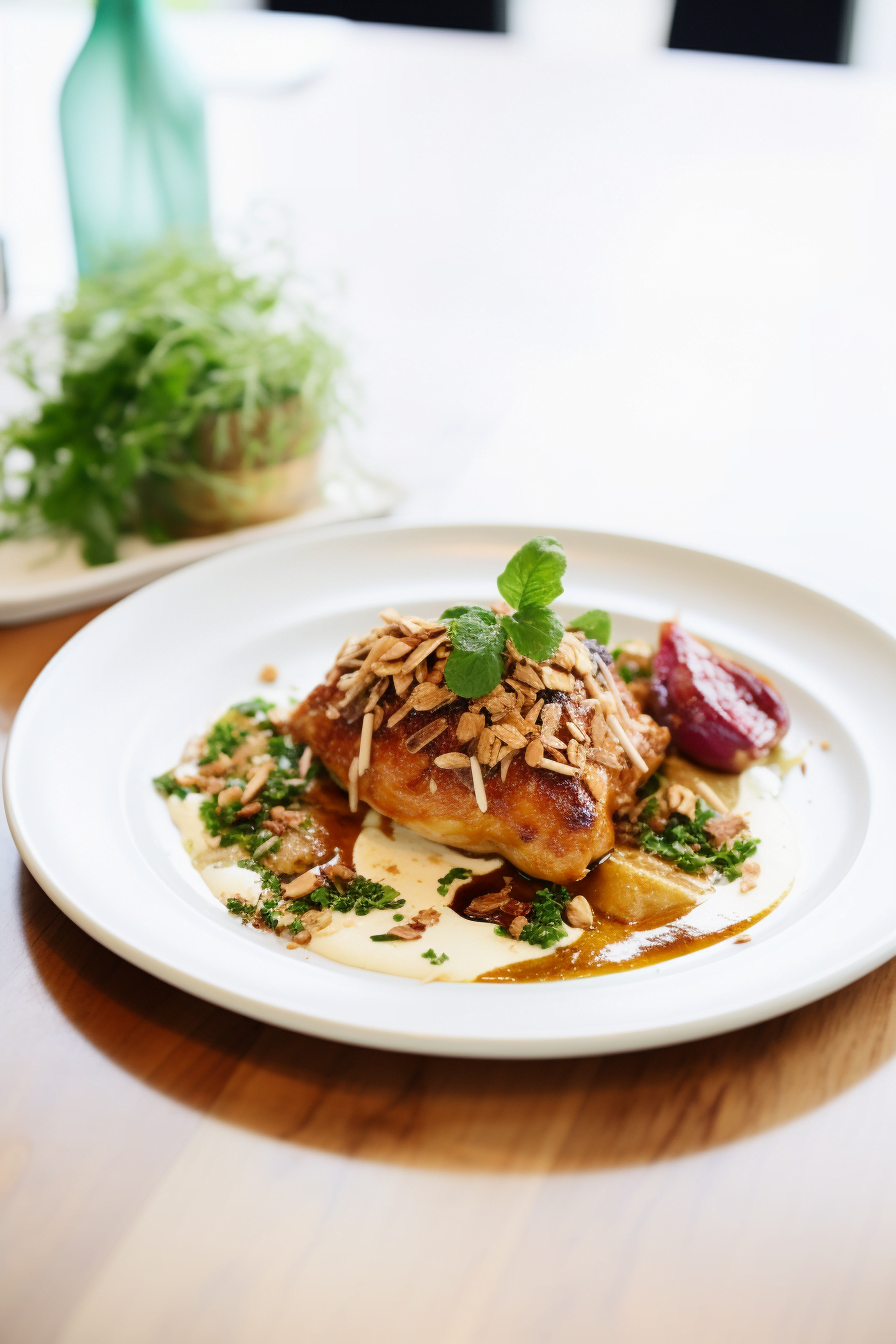
Variations to the Classic Musakhan
Vegetarian Musakhan
For a vegetarian twist, replace the chicken with thick slices of portobello mushrooms. The mushrooms’ meaty texture makes them a satisfying substitute, and they absorb the sumac and spices beautifully. Simply marinate the mushrooms as you would the chicken and proceed with the recipe, reducing the baking time accordingly.
Spicy Musakhan
If you enjoy a bit of heat, add a kick to your Musakhan by incorporating chili flakes or a diced hot pepper into the onion mixture. The heat will cut through the richness of the dish, adding an extra layer of complexity to the flavors.
Lamb Musakhan
Lamb is a beloved meat in Palestinian cuisine and can be used in place of chicken for a richer, more robust version of Musakhan. Opt for lamb shoulder, seasoned and slow-cooked until tender, then shredded and layered with the caramelized onions on the flatbread.
Substitutions for Musakhan Ingredients
While traditional ingredients are preferred, sometimes substitutions are necessary. Here are some alternatives that maintain the integrity of the dish:
Sumac Substitute: If sumac is not available, a mixture of lemon zest and a pinch of paprika can mimic its tangy flavor. Although not identical, this combination will provide a similar citrusy note.
Flatbread Alternative: In the absence of taboon bread, lavash is an excellent substitute. Its thin, pliable nature makes it perfect for soaking up the juices and flavors of the Musakhan.
For Nut Allergies: If pine nuts are off the table due to allergies, toasted slivered almonds or sunflower seeds can provide a comparable crunch and nuttiness to the dish.
Frequently Asked Questions
Q: Can I make Musakhan ahead of time?
A: Yes, you can prepare the caramelized onions and marinate the chicken in advance. Assemble and bake when ready to serve for the best texture and warmth.
Q: How do I store leftovers?
A: Store any leftover Musakhan in an airtight container in the refrigerator for up to 3 days. Reheat in the oven to maintain crispness.
Q: What side dishes pair well with Musakhan?
A: A simple cucumber and tomato salad dressed with olive oil and lemon juice complements the richness of Musakhan perfectly.
Q: Can I use boneless chicken?
A: While bone-in chicken thighs are traditional, boneless thighs can be used for a quicker cooking time. Adjust baking time accordingly.
Q: Is Musakhan spicy?
A: Musakhan is not typically spicy, but the level of heat can be adjusted to personal preference with the addition of chili flakes or hot peppers.
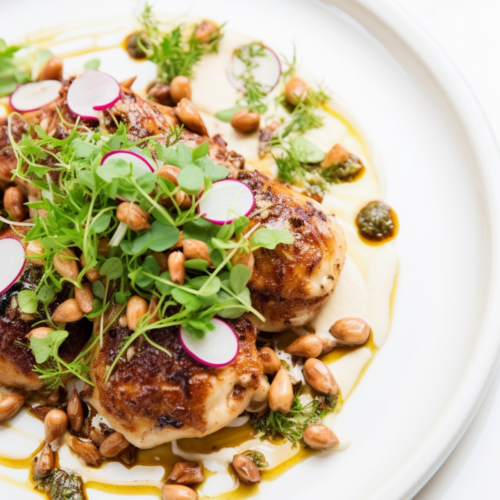
Palestinian Musakhan with Sumac Chicken and Caramelized Onions
Equipment
- Large skillet
- Baking dish
- Aluminum foil
- Baking sheet
- Dry pan
Ingredients
- 4 large chicken thighs about 2 lbs or 900g
- 2 tbsp olive oil 30ml
- 4 large onions, thinly sliced about 2 lbs or 900g
- 1/4 cup sumac 30g
- 2 tsp ground cumin 4g
- 1 tsp ground coriander 2g
- Salt and pepper to taste
- 4 large pieces of taboon bread or any flatbread like naan or pita
- 1/4 cup pine nuts 30g, toasted
- 2 tbsp chopped fresh parsley 8g
Instructions
- Preheat your oven to 375°F (190°C). Season the chicken thighs with salt, pepper, 2 tablespoons of sumac, ground cumin, and ground coriander.
- In a large skillet over medium heat, add the olive oil. Once hot, sear the chicken thighs until they are golden brown on both sides, about 5 minutes per side. Transfer the chicken to a baking dish and set aside.
- In the same skillet, add the sliced onions and a pinch of salt. Cook over low heat, stirring occasionally, until the onions are deeply caramelized and sweet, about 30 minutes. Halfway through cooking, sprinkle the remaining sumac over the onions.
- Once the onions are caramelized, layer them on top of the chicken thighs in the baking dish. Cover with aluminum foil and bake in the preheated oven for about 30 minutes, or until the chicken is fully cooked and tender.
- While the chicken is baking, toast the pine nuts in a dry pan over medium heat until golden brown, and set aside.
- To assemble, place the flatbreads on a baking sheet and warm in the oven for a few minutes. Remove the chicken from the oven and let it rest for a few minutes before placing on top of the flatbreads.
- Spoon the caramelized onions over the chicken, sprinkle with toasted pine nuts and chopped parsley. Serve immediately.
Notes

